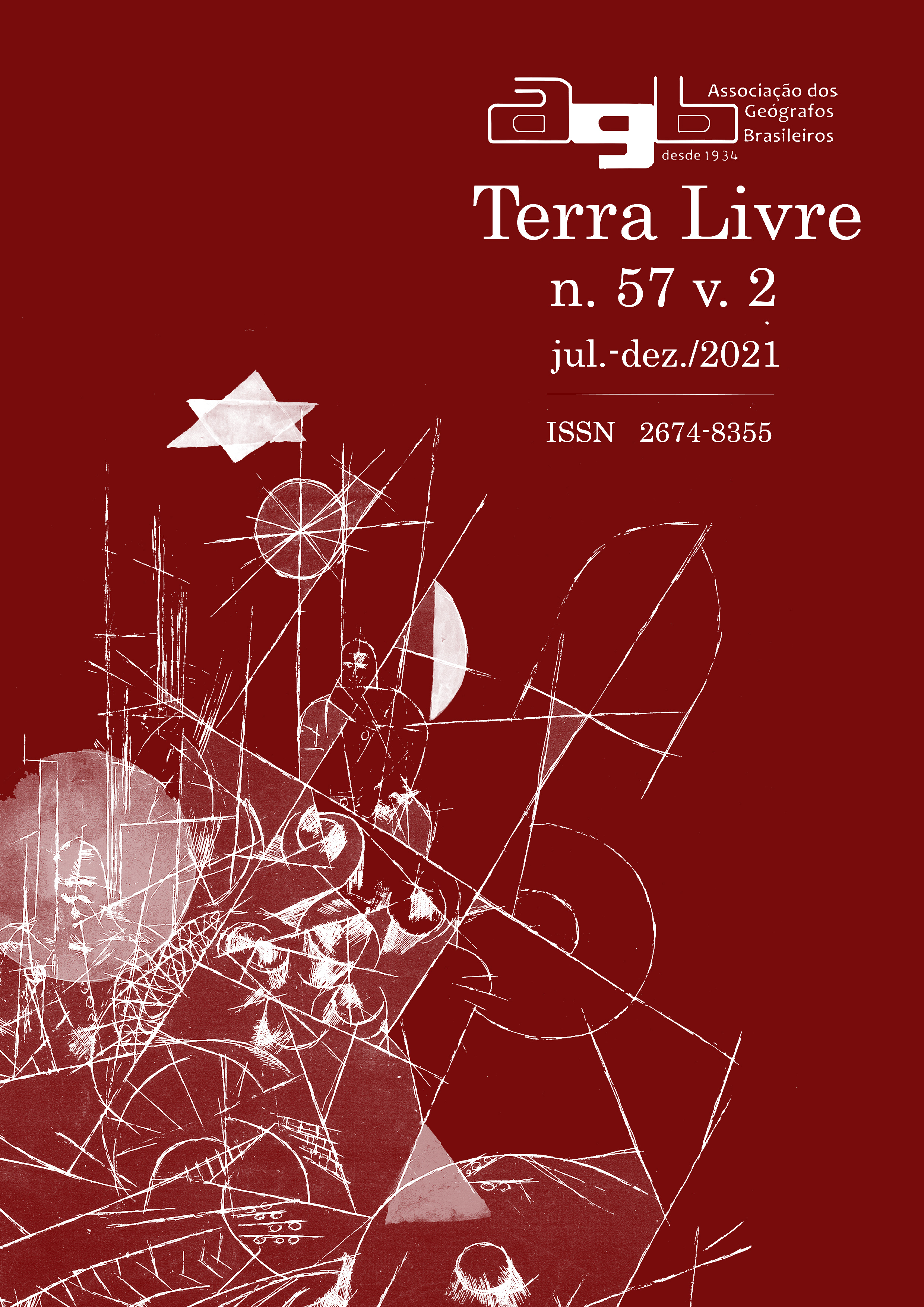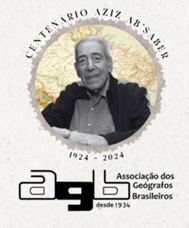AS LONG AS THE LAND IS NOT FREE, NEITHER AM I:
THE JARE OF CHAPADA DIAMANTINA (BA) AS A RESCUE OF MEMORY IN TORTO ARADO
DOI:
https://doi.org/10.62516/terra_livre.2021.2288Keywords:
consciousness of the place, Coloniality, Racism, Psychosphere, Land ReformeAbstract
The present work intends approximations between the geographical doing and literature, using the fables created by Itamar Vieira Jr. in Torto Arado. It denounces, through the analysis of hierarchical social constructions, the subjectivities of the Brazilian people as an imaginary, reality and patterns of colonial permanence, which include everything from the insistent land interdiction that spans centuries to the myth of racial democracy, hiding the black presence and the black memory of history and geography of the places, having as spatial clipping the efabulation of Chapada Diamantina in Bahia, through the practices of African matrix of Jarê. It comprises as a theoretical basis, above all, contributions from professor Milton Santos and intellectual Lélia Gonzalez when thinking about the consciousness and memory by migrant and diasporic people, and the Afrocentricity of Molefi Asante as the methodological approach.
Downloads
References
ASANTE. Molefi K. Afrocentricidade: Notas sobre uma posição disciplinar. In: NASCIMENTO, E. L. (org). Afrocentricidade: Uma Abordagem Epistemológica Inovadora. São Paulo: Selo Negro, 2009. (Sankofa: matrizes africanas da cultura brasileira; 4), p. 93-110.
CASTRO, Júlia Fonseca de. Geografia e Literatura: da aproximação ao diálogo. In: Geografia, Literatura e Arte: epistemologia, crítica e interlocuções. Porto Alegre: Imprensa Livre, 2016. p. 332-347.
GADELHA, Regina Marta d'Aquino Fonseca. A Lei de Terras (1850) e a abolição da escravidão: capitalismo e força de trabalho no Brasil do século XIX. R. História, São Paulo. 120, p. 153-162, jan./jul. 1989. DOI: https://doi.org/10.11606/issn.2316-9141.v0i120p153-162
GONZALEZ, Lélia. A categoria político-cultural de amefricanidade. In: Por um feminismo afro-latino- americano: Ensaios, Intervenções e Diálogos. Editora Zahar, Rio de Janeiro, 2020.
GONZALEZ, Lélia. Racismo e Sexismo na Cultura Brasileira. In: Revista Ciência Sociais Hoje, Anpocs, 1984, p. 223-244.
KRENAK, Ailton. O amanhã não está à venda. São Paulo: Companhia das Letras, 2020a.
__________________. A vida não é útil. São Paulo: Companhia das Letras, 2020b.
SANTOS, Milton. O Lugar e o Cotidiano. In: A Natureza do Espaço: Técnica e Tempo, Razão e Emoção. 4. Ed. São Paulo: Editora da Universidade de São Paulo, 2017. p. 313-330.
SOUSA SANTOS. Boaventura de. Para uma sociologia das ausências e uma sociologia das emergências. In: Conhecimento prudente para uma vida decente: um discurso sobre as ciências revisitado / Boaventura de Sousa Santos, (org.). - 2. ed. - São Paulo: Cortez, 2002. DOI: https://doi.org/10.4000/rccs.1285
SENNA, Ronaldo. AGUIAR, Itamar. Jarê: instalação africana na Chapada Diamantina. In: Revista Afro-Ásia: Centro de Estudos Afro-Orientais UFBA, 13. Ed. 1980. DOI: https://doi.org/10.9771/aa.v0i13.20811
VIEIRA JR., Itamar. Torto Arado. Editora Todavia, São Paulo, 2019.
Downloads
Published
How to Cite
Issue
Section
License
Esta Revista está licenciado sob uma licença 
Os Direitos Autorais dos artigos publicados na Terra Livre pertencem ao(s) seu(s) respectivo(s) autor(es), com os direitos de primeira publicação cedidos à Terra Livre.
Os artigos publicados são de acesso público, de uso gratuito, com atribuição de autoria obrigatória, para aplicações de finalidade educacional e não-comercial, de acordo com o modelo de licenciamento Creative Commons 3.0 adotado pela revista.

A Terra Livre está licenciada sob uma licença Creative Commons Atribuição-NãoComercial-CompartilhaIgual 3.0 Não Adaptada.
Você é livre para:
- Compartilhar — copie e redistribua o material em qualquer meio ou formato
- Adaptar — remixar, transformar e construir sobre o material
- O licenciante não pode revogar essas liberdades, desde que você siga os termos da licença.
Nos seguintes termos:
- Atribuição — Você deve dar o crédito apropriado , fornecer um link para a licença e indicar se as alterações foram feitas . Você pode fazê-lo de qualquer maneira razoável, mas não de qualquer forma que sugira que o licenciante endossa você ou seu uso.
- Não Comercial — Você não pode usar o material para fins comerciais .
- ShareAlike — Se você remixar, transformar ou construir sobre o material, você deve distribuir suas contribuições sob a mesma licença que o original.
- Sem restrições adicionais — Você não pode aplicar termos legais ou medidas tecnológicas que restrinjam legalmente outras pessoas de fazer qualquer coisa que a licença permita.












